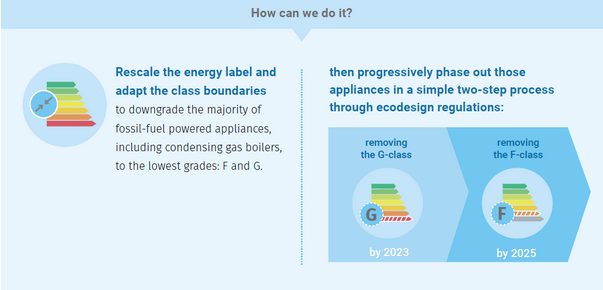The EU must phase out new fossil fuel heaters by 2025, or will not reach climate neutrality on time – new Coolproducts report
A phase-out of gas and oil boilers could bring about 110 million tonnes of annual CO2 savings by 2050, research by Coolproducts experts shows. This is two thirds of the total emissions reduction needed from residential and public buildings to achieve climate neutrality by 2050.

New research carried out by Coolproducts experts shows that ending the installation of new boilers fired by gas, oil and coal as of 2025 would bring about emission savings of 110 million tonnes of CO2 by 2050 – more than one third of the annual total CO2 emissions of France in 2016.
The European Commission estimates that a 40% reduction in gas heating emissions is needed to achieve the EU’s 2030 climate goals. But this objective can only be met if we stop installing new gas boilers as soon as possible.
The challenge ahead
Decarbonising heating will not be that easy, however: 28% of the total energy consumed in the EU is used in space and water heating. In the residential sector, 75% of this energy comes from fossil fuels such as gas, oil or coal.
Let’s start with the good news: warming our homes without heating up the planet is possible. Technologies such as heat pumps or solar thermal can do the job in a much cleaner way. So, what is the problem? Unfortunately, only about 17.3% of the heating appliances installed in European homes use electricity or clean energy sources today.
Luckily, this can be fixed. The EU does have the tools to help us decarbonise heating at a sufficient pace: the Ecodesign and Energy Labelling regulations. In place since 2013, they have enabled CO2 savings of about 20Mt in 2020 alone. It is now up to lawmakers to make these regulations bolder – by removing the most inefficient electric and fossil-fuel fired boilers from the market by 2025. This is the only way to achieve the CO2 emission reduction target of 55% in 2030 and the climate neutrality objective in 2050.
These findings are detailed in a new report by ECOS and Coolproducts experts: ‘Five years left – how ecodesign and energy labels can decarbonise heating’.
Five years left for action
The EU needs to end the installation of fossil fuel-based and inefficient electric heating systems and replace them with renewably sourced ones, such as efficient heat pumps, solar thermal, or hybrid heat pumps [1]. And it needs to be done by 2025, given that gas boilers have an average technical lifetime of 22 to 25 years.
Today, almost half of EU buildings are equipped with boilers installed before 1992. The majority are of the most polluting and inefficient types. Among the 129 million boilers installed in the EU, more than 50% are very inefficient, ranked in C or lower energy classes. Worse still, most of the boilers installed in Europe are fired by gas (58%).

How can European lawmakers make sure that boilers powered by fossil fuels become a thing of the past? Key to this will be using Ecodesign and Energy Labelling regulations to their full potential. The European Union should rescale the energy label for heaters to downgrade most appliances powered by fossil fuels, including condensing gas boilers, to the lowest grades: F and G.
Then, we need to phase out those appliances in two steps: as of 2023, the worst performers, G-class, should be removed from the market. In 2025, F-class boilers should follow suit and be eliminated. At the same time, the highest classes should be reserved only for the best performing technologies so that buyers can easily spot the most efficient options.

Time to rescale the label
The European Commission is currently reviewing the Ecodesign and Energy Labelling regulations for space and water heaters, a process that started in 2018. However, at the moment we see a huge gap between the climate ambitions put forward by the Commission’s leadership and the superficial proposals put forward in the revision of the actual product legislation, still granting unfair advantages to fossil fuel technologies. For example, condensing gas boilers are proposed to remain labelled as ‘A-class’.
To top it off, the proposal for a revised label suggests keeping the A+, A++, and A+++ classes. This would create confusion as other products are already transitioning into a rescaled A-G label, with the European Commission informing consumers that ‘A+’ labels are a thing of the past.
Unfortunately, the fact that fossil fuel technologies could be given an A-class label does not come as a surprise. The current proposal goes in line with the Energy Labelling Framework Regulation adopted in 2017, which granted an exemption for space heaters, giving them until 2026 to adapt to the new A-G rescaling. Consequently, even if we do not rescale the label now, it will have to happen before 2026. This way, however, we will have changed the label twice in five years – a waste of time and taxpayers’ money.
Even more worrying, the current plans to solve the heating problem involve ‘decarbonised gases’, such as hydrogen produced from renewable energy and biogas out of organic waste degradation, as an option for decarbonisation. This, despite the fact that mounting evidence shows these rare ‘green’ gases should only be used in sectors that are hard to electrify, such as industry, which is not the case for domestic heating.
To align with science, European policymakers must act now and end the installation of fossil fuel boilers as of 2025 – or else we will suffer the consequences well beyond 2050. Our new report provides all the necessary background and calculations for them to make the right choices.
—————
[1] Heat pumps with a back-up that can be powered by fossil fuels.


